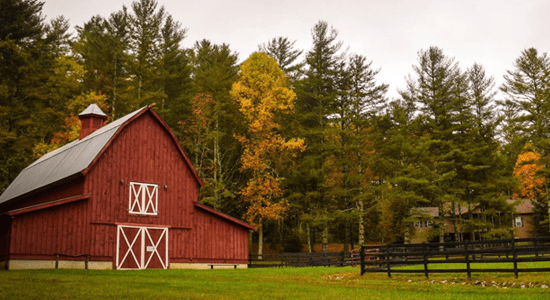Claiming VAT on the construction of a new working farmhouse
So, your client is a VAT registered farmer operating a full-time farming business and lives in the onsite farmhouse.
Previously your client has had to have the roof of the farmhouse repaired and a new heating system installed to replace the old one and you previously claimed 70% of the VAT incurred on these repairs, in line with HMRC’s published guidance in their online manual VIT40000.

The farmer is now considering demolishing the existing house and building a new one elsewhere on the farm in order to make way for additional agricultural buildings but the planning permission that will be granted for the new farmhouse limits occupation to those solely employed by the farming business.
Therefore, the new farmhouse will not qualify as a new dwelling under the definition in the VAT Act, so the build cannot be zero-rated, and your client will incur quite significant amounts of VAT on the build.
VAT recovery
However, the guidance at VIT40000 only discusses VAT recovery in regard to repairs and maintenance to a working farmhouse and given the wording, that clearly must refer to work to an existing building, not the construction of a new building.
So, can your client claim any of the VAT he incurs if he builds a new farmhouse?
The goods news is that he can claim 70% of the VAT incurred on building the new farmhouse, or at least has a very strong argument supported by Case Law for recovery of 70% of the VAT incurred.
Employment tribunal
These relevant cases are referred to in HMRC’s online manual at VIT6450:
- A C Eccles & Co (EDN/85/71)
- WJ & L Greig & Son (EDN/88/56)
- W Cupit & Sons (MAN/89/891)
In the cases of Eccles and Greig, the businesses renovated and restored existing, but poor condition, residential accommodation on their farms for use by either themselves or by employees considered necessary to be onsite and available to the businesses at all times to allow the running of the farm business.
In both cases, they claimed VAT on the works undertaken to the properties, HMRC denied the recovery and the Tribunal ruled that the purpose of the expenditure was predominantly for the purposes of the business and so VAT recovery should be allowed on a business/non-business apportionment basis.
Therefore, following the then Customs and Excise’s own policy of accepting that 70% of the use of a working farmhouse is business, the Tribunal allowed VAT recovery at 70%.
However, the case of Cupit is perhaps the strongest case in support of 70% VAT recovery on the building of a new working farmhouse.
In that case, the farming partnership converted an existing barn on the farm premises into a dwelling for use by one of the partners, who again needed to be close to the farm to allow the effective operation of the livestock farming business.
Again, the business claimed VAT incurred on the conversion of the barn, HMRC denied the VAT and the Tribunal again found that the predominant purpose of the conversion was the business of the farm and so, citing the earlier Tribunal findings in Eccles and Greig, again allowed 70% VAT recovery.
Given that the case in Cupit involved the creation of a working farmhouse, albeit created from the conversion of an existing non-residential building, then the case would also appear to strongly support VAT recovery in regard to the construction of a new working farmhouse on the basis that the predominant purpose of the property is for the business and that recovery should be allowed at 70%, based on HMRC’s current policy of accepting 70% business use of farmhouses.
[contact-block]Related News Articles
Mileage Tax Relief Guide
Guide to Claiming Tax Relief on Mileage Expenses (Where Reimbursed Below HMRC Rates) Step 1: Confirm Eligibility You may claim tax relief if: - The mileage relates strictly to business travel (not ordinary commuting). - You are using your own vehicle. - Your employer reimburses you below the HMRC Approved Mileage Allowance Payments (AMAP): -…
Government to Raise Income Threshold for Self-Assessment Reporting and Launch Simple Online Tax Payment System
Move expected to reduce administrative burdens for up to 300,000 taxpayers The Government has announced its intention to raise the income threshold at which individuals are required to register for Self-Assessment. This change will affect taxpayers with low levels of trading, property, or miscellaneous income and forms part of a broader package aimed at simplifying…
Mandatory Real-Time Reporting of Benefits in Kind Delayed Until April 2027
HMRC delays mandatory payrolling of most employee benefits by one year HM Revenue & Customs (HMRC) has confirmed a 12-month delay in the implementation of mandatory real-time reporting for most benefits in kind (BiKs). Initially expected to come into force in April 2026, the requirement will now apply from April 2027. This extension follows feedback…